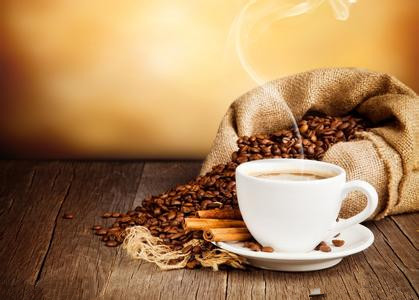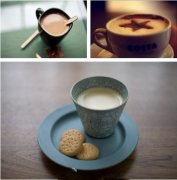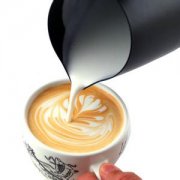Three factors have a direct influence on coffee flower drawing.
Cows all grow in the same place and eat the same food. Three factors have a direct impact on milk: Lactose, milk fat and protein content.

Lactose sweetens milk. Lactose is a disaccharide molecule, which is composed of galactose and glucose and exists in milk. Lactose does not decompose in water and does not taste sweet when it cools, but when heated, it becomes soluble, releases sugars and increases sweetness.
Pour whole milk and skim milk into two cups respectively and you will find that skim milk is light in taste and texture, compared with water, and has no special feeling after drinking it; however, whole milk is thicker and feels weightier. Why? This is because the content of milk fat is different. Whole milk contains 4% or more of milk fat. What we often call Cream is a thin layer of cream formed on the surface of milk, which contains more cream and tastes better than the milk itself.
Through machine extraction, the manufacturer can adjust the milk fat content to 2% (equal to 50% concentrated), 2% (equal to almost all milk fat concentrated), and skim (all milk fat is removed, leaving only water, protein and sugar). In theory, whole milk can give coffee a strong taste, but some people still like skim milk because they think that the milk fat in whole milk is harmful to health.
Then let's talk about milking. Protein is the third most important factor for baristas after lactose and milk fat. When you heat the milk, the protein changes from the sol state to the gel state, forming a film that surrounds the air molecules and forms a floating substance, commonly known as milk foam. Milk fat content, protein, and temperature all affect the formation of milk bubbles.
If the fat content increases, the stability of foaming will be reduced. So it's much easier to use skim milk to make a lot of thick foam than whole milk. However, when the milk fat content reaches 5% or more, the stability of milk bubbles will be relatively improved. So you will find that the foam made in the state of 10% milk fat is quite dense and stable. This is why edible liquid cream with 18% milk fat and whip cream (the kind applied on birthday cakes) with 35% milk fat are so stable and productive.
Important Notice :
前街咖啡 FrontStreet Coffee has moved to new addredd:
FrontStreet Coffee Address: 315,Donghua East Road,GuangZhou
Tel:020 38364473
- Prev

10 factors to consider when buying green coffee beans
Green bean sellers are primarily responsible for grading coffee beans before selling them to coffee bean merchants. After grading, premium and premium coffee beans are selected, although they may have some flaws that do not affect the coffee rating. These flaws are less severe, but they can potentially damage coffee quality. Although Cupping is undoubtedly the clearest way to examine coffee beans
- Next

Tips on common sense of drinking coffee to make coffee taste better
KopiLuwak! It is said that Finns can easily get delicious coffee by saying this spell to coffee before drinking coffee. Maybe it's just a movie or a myth to lie to children, but there are coincidences if you want to make your coffee tastier. 1. How can you keep your coffee beans longer? The solution is not to expose it to the air. At the same time, grinding
Related
- Beginners will see the "Coffee pull flower" guide!
- What is the difference between ice blog purified milk and ordinary milk coffee?
- Why is the Philippines the largest producer of crops in Liberia?
- For coffee extraction, should the fine powder be retained?
- How does extracted espresso fill pressed powder? How much strength does it take to press the powder?
- How to make jasmine cold extract coffee? Is the jasmine + latte good?
- Will this little toy really make the coffee taste better? How does Lily Drip affect coffee extraction?
- Will the action of slapping the filter cup also affect coffee extraction?
- What's the difference between powder-to-water ratio and powder-to-liquid ratio?
- What is the Ethiopian local species? What does it have to do with Heirloom native species?

